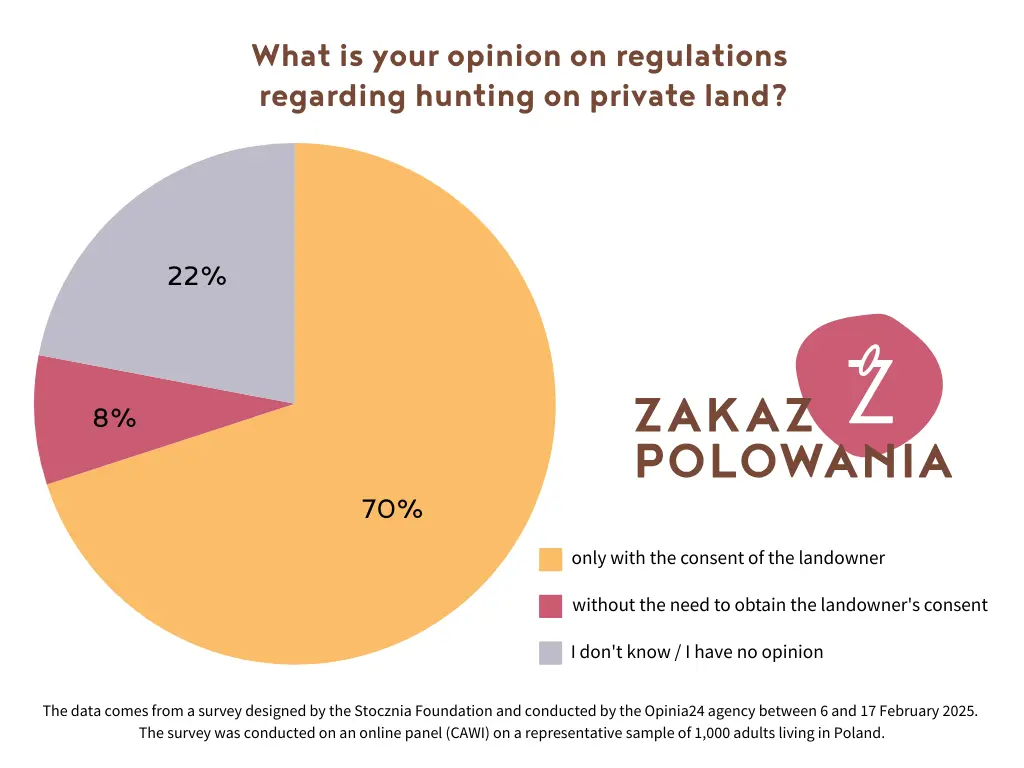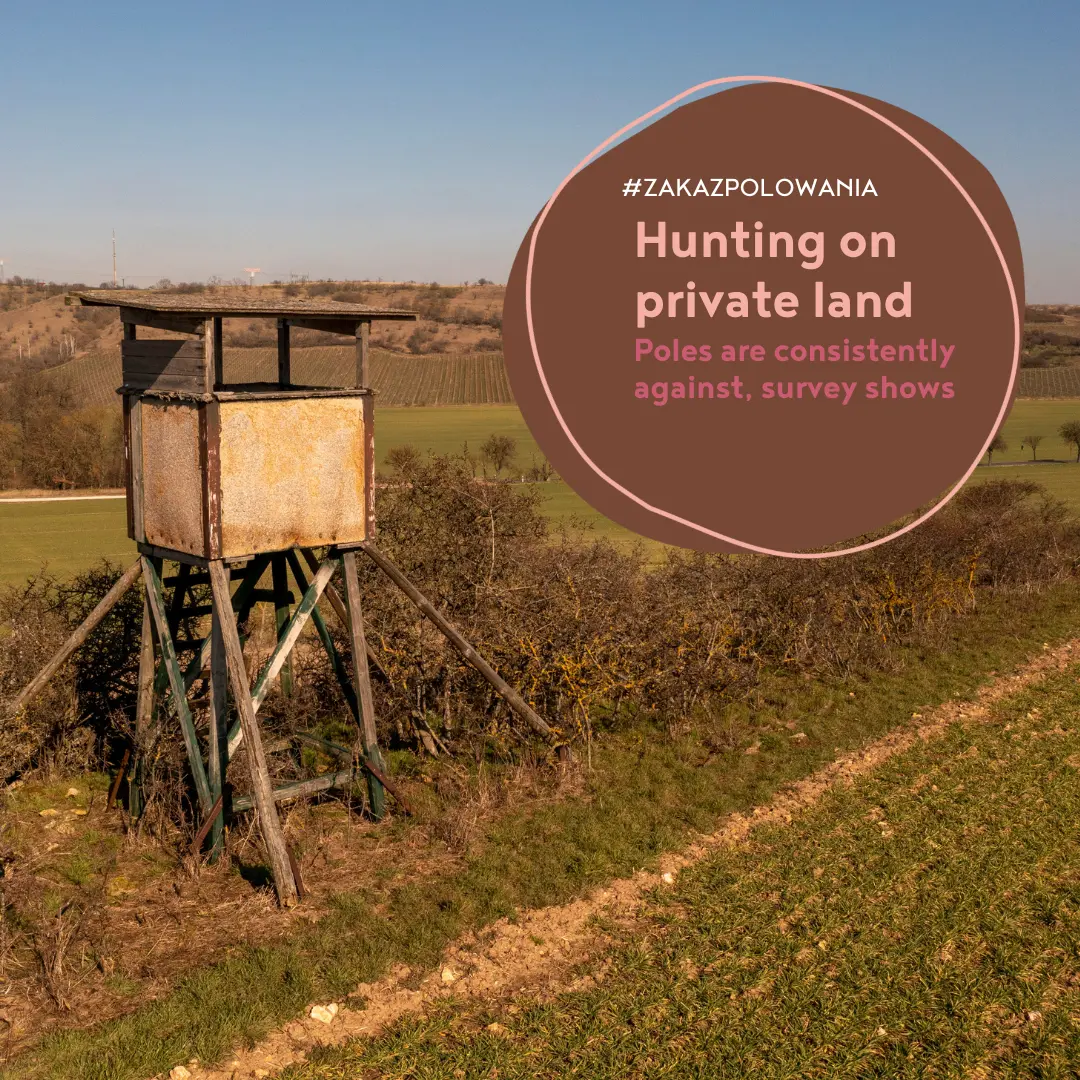Hunting on Private Land – What Do Poles Think?
Hunting on private land has long been a contentious issue in Poland. The debate revolves around cases where hunters, as part of designated hunting districts, enter private property—whether fields, meadows, or forests—without the landowner's consent. For decades, Polish hunting laws have favored hunters: unlike in most European countries, the right to hunt was not linked to land ownership. Landowners had little to no say when their land was included in a hunting district, nor did they receive any benefits from it. This situation led to growing frustration. Even within hunting circles, some acknowledge that while society was largely indifferent to hunting in the past, a growing number of people now "justifiably object to strangers entering their land to hunt without even being required to notify the landowner."
This rising public opposition coincided with heated debates over amendments to the Hunting Law and a landmark 2014 Constitutional Tribunal ruling. The court declared that preventing landowners from excluding their property from hunting districts was unconstitutional. As a result, in 2018, a legal provision was introduced granting landowners a limited right to object: they could submit a declaration to the county office prohibiting hunting on their property. However, this right came with a major caveat—landowners who exercised it lost the ability to claim compensation for damage caused by wildlife on their land.
For many opponents of hunting, this was far from sufficient. The process was bureaucratic and placed the financial burden of protecting private property squarely on the landowner. Despite these legislative changes, a fundamental question remains: should hunters have the right to hunt on someone else’s land without the owner’s consent?
Strong Support for Landowners’ Rights
Public opinion research provides a clear answer: the vast majority of Poles oppose hunting on private land without the owner's consent. Years ago, during debates over amendments to the Hunting Law, surveys already indicated strong support for private property rights. In a 2016 CBOS poll, 81% of respondents stated that protecting private property was more important than the right to hunt, clearly rejecting the creation of hunting districts on private land without the owner’s permission. Only 8% held the opposite view, while the rest were undecided. Similarly, a July 2024 survey by the research agency Zymetria found that 89% of respondents supported the principle that landowners should have full authority over hunting activities on their property—demonstrating a strong societal demand for respect for property rights.
Recent data confirm this trend. A nationwide study conducted between February 6–17, 2025, by the agency Opinia24 found that 70% of Poles believe hunting on private land should only be allowed with the explicit consent of the landowner. Only 8% held the opposite view, believing that hunters should have the right to enter private property for hunting without permission, while approximately 22% were undecided. In other words, among those with a formed opinion, the belief that owner consent is necessary outweighs the opposing view by nearly 9:1—an overwhelming pro-landowner stance.
Crucially, this strong support for landowners' rights is consistent across all social and demographic groups. Regardless of gender, age, education level, or place of residence, the majority of respondents agree that hunters should only be allowed to access private land with the explicit permission of the landowner.

Growing Pressure on Lawmakers
Such strong public consensus translates into mounting pressure on policymakers. During the 2018 debates on amending the Hunting Law, opposition to disregarding landowners’ rights came not only from NGOs but also from thousands of concerned citizens. Petitions and public appeals emphasized that private property rights must take precedence over hunters' interests, in line with the Constitutional Tribunal’s ruling. Ultimately, as mentioned earlier, the law was amended—but only partially—granting some landowners the ability to prohibit hunting on their land by filing a formal declaration.
In practice, however, many landowners remain unaware of this option or choose not to exercise it out of fear of losing compensation for wildlife damage. As a result, conflicts persist: hunters still retain the formal right to enter private land as part of designated hunting districts, while landowners who have not gone through the required legal procedures to exclude their land are left powerless. The sight of armed individuals hunting on private property—often without prior notice—can be shocking and understandably frustrating for landowners. As one forester and member of the Polish Hunting Association bluntly stated, "A private landowner has no say" when their property is part of a hunting district. Only recently have landowners gained the right to formally object, but existing regulations still allow hunting to take place against their will.
Social Backlash and Its Consequences
The widespread opposition to hunting without landowner consent is driven by multiple factors—concerns over property rights, safety, and the ability to enjoy nature without fear of encountering an active hunt. Citizens are increasingly vocal about their rights: they want to walk through forests and fields without worrying about stumbling upon a hunting party, and if a hunt is scheduled, they demand to be properly informed in advance. Unfortunately, this expectation is often unmet—group hunting events are not always well-marked or publicly announced, which heightens feelings of insecurity. Unsurprisingly, 91% of surveyed Poles support the idea of easy access to information about planned hunts, such as public hunting schedules.
However, the more fundamental question remains: Why should anyone be allowed to shoot on my land if I don’t want them to? This is not just a legal issue—it’s an ethical one. The right to private property extends beyond ownership; it includes the right to oppose the killing of animals on one’s land. For many, hunting is morally questionable, and being forced to tolerate it on their own property feels like a violation of their freedom of conscience.
As a result, public pressure is pushing for further legal changes. The demand is clear: hunting rights should be fully subordinated to property rights—no hunting without explicit landowner consent, period. Three-quarters of society supports this position, while opposition to such a change is minimal. It is now evident that hunters lack public approval to enter private land with firearms against the will of the owner. This lack of societal mandate weakens the legitimacy of the current hunting system and encourages politicians to reform it.
Recent developments show that hunting in Poland is no longer a niche issue—it has become a subject of mainstream debate. More and more people are rejecting the idea of a "hunter’s republic," where hunters dictate the rules to the broader public. Today, the majority of Polish society clearly says no to hunting on private land without the owner’s consent.



